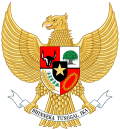Wilopo Cabinet Kabinet Wilopo | |
|---|---|
| Cabinet of Indonesia | |
| 3 April 1952 – 1 August 1953 | |
 Members of the cabinet at the Merdeka Palace | |
| Date formed | 3 April 1952 |
| Date dissolved | 1 August 1953 |
| People and organisations | |
| President | Sukarno |
| Prime Minister | Wilopo |
| Member parties | |
| History | |
| Predecessor | Soekiman |
| Successor | Ali Sastroamidjodo I |
The Wilopo Cabinet (Indonesian : Kabinet Wilopo) [a] was the cabinet of Indonesia from April 1952 to August 1953. Led by Wilopo as prime minister, the cabinet was a coalition government consisting of the Indonesian National Party (PNI) and the Masyumi Party, along with several smaller parties.
